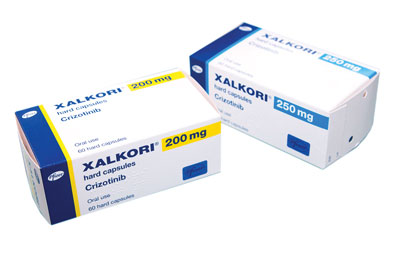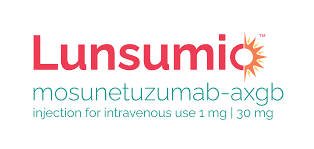Xalkori (crizotinib) vs Lunsumio (mosunetuzumab-axgb)
Xalkori (crizotinib) vs Lunsumio (mosunetuzumab-axgb)
Xalkori (crizotinib) and Lunsumio (mosunetuzumab-axgb) are two different types of cancer medications used to treat distinct conditions. Xalkori is a small molecule tyrosine kinase inhibitor specifically designed for the treatment of non-small cell lung cancer (NSCLC) with certain genetic alterations, such as ALK or ROS1 rearrangements. In contrast, Lunsumio is a bispecific T-cell engager antibody indicated for the treatment of relapsed or refractory follicular lymphoma, targeting CD20 on B cells and CD3 on T cells to recruit the body's own immune system to fight the cancer. When deciding which medicine is appropriate, a patient must consider their specific type of cancer, the genetic characteristics of their tumor, and consult with their healthcare provider to determine the most effective treatment option based on their individual medical condition.
Difference between Xalkori and Lunsumio
| Metric | Xalkori (crizotinib) | Lunsumio (mosunetuzumab-axgb) |
|---|---|---|
| Generic name | Crizotinib | Mosunetuzumab-axgb |
| Indications | Non-small cell lung cancer (NSCLC), ALK or ROS1-positive metastatic NSCLC | Follicular lymphoma |
| Mechanism of action | ALK and ROS1 tyrosine kinase inhibitor | Bi-specific T-cell engager (BiTE) antibody |
| Brand names | Xalkori | Lunsumio |
| Administrative route | Oral | Intravenous |
| Side effects | Visual disorders, gastrointestinal disturbances, edema, elevated transaminases, fatigue | Cytokine release syndrome, infections, fatigue, diarrhea, rash |
| Contraindications | Hepatic impairment, concurrent use of strong CYP3A inhibitors or inducers | None known |
| Drug class | Tyrosine kinase inhibitor | Monoclonal antibody |
| Manufacturer | Pfizer | Genentech |
Efficacy
Xalkori (Crizotinib) Efficacy in Lymphoma
Xalkori (crizotinib) is primarily known for its use in treating non-small cell lung cancer (NSCLC) that is anaplastic lymphoma kinase (ALK)-positive. However, its efficacy in lymphoma, particularly anaplastic large cell lymphoma (ALCL), has been a subject of clinical interest. ALCL is a subtype of non-Hodgkin lymphoma, and a subset of ALCL patients express the ALK protein due to a chromosomal translocation. Crizotinib, being an ALK inhibitor, has shown potential in preclinical studies and some clinical cases for treating ALK-positive ALCL. The response rates in these cases have been promising, but it is important to note that crizotinib is not yet widely established or approved for the treatment of lymphoma, and its use would be considered off-label.
While there are no large-scale, randomized clinical trials that specifically evaluate crizotinib's efficacy in lymphoma, case reports and smaller studies suggest that ALK-positive lymphoma patients can benefit from this targeted therapy. The drug's effectiveness in these patients is attributed to its mechanism of action, which involves the inhibition of the kinase activity of the ALK fusion protein, leading to the death of ALK-positive cancer cells. However, more research is needed to fully understand the efficacy and safety of crizotinib in the treatment of lymphoma.
Lunsumio (Mosunetuzumab-axgb) Efficacy in Lymphoma
Lunsumio (mosunetuzumab-axgb) is a bispecific antibody designed to target CD20 on B cells and CD3 on T cells, bringing them into close proximity and thereby promoting the destruction of B-cell lymphomas. Mosunetuzumab has shown efficacy in the treatment of several types of B-cell non-Hodgkin lymphoma, including follicular lymphoma and diffuse large B-cell lymphoma (DLBCL). Clinical trials have demonstrated that mosunetuzumab can induce durable responses in patients with relapsed or refractory non-Hodgkin lymphoma, including those who have failed multiple prior lines of therapy.
Notably, in a pivotal phase I/II study, mosunetuzumab demonstrated a complete response rate in a significant proportion of patients with relapsed or refractory follicular lymphoma. The treatment was generally well-tolerated, with manageable side effects. The promising results of these clinical trials have led to the accelerated approval of mosunetuzumab by regulatory agencies for the treatment of certain types of lymphoma. As a new therapeutic option, mosunetuzumab represents a significant advancement in the treatment of B-cell lymphomas, particularly for patients who have exhausted other treatment options.
Regulatory Agency Approvals
Xalkori
-
European Medical Agency (EMA), European Union

-
Food and Drug Administration (FDA), USA

-
Health Canada

-
Pharmaceuticals and Medical Devices Agency (PMDA), Japan

-
Therapeutic Goods Administration (TGA), Australia

Lunsumio
-
European Medical Agency (EMA), European Union

-
Food and Drug Administration (FDA), USA

Access Xalkori or Lunsumio today
If Xalkori or Lunsumio are not approved or available in your country (e.g. due to supply issues), you can access them via Everyone.org.
How it works

Make an enquiry
Choose the medicine you want to buy, answer a couple of questions, and upload your prescription to speed things up. We’ll get back to you within 24 hours.


Make an enquiry
Choose the medicine you want to buy, answer a couple of questions, and upload your prescription to speed things up. We’ll get back to you within 24 hours.


Breeze through the paperwork
We'll guide you through the required documents for importing unapproved medicine, ensuring you have all the necessary information.


Get a personalized quote
We’ll prepare a quote for you, including medicine costs and any shipping, administrative, or import fees that may apply.


Receive your medicine
Accept the quote and we’ll handle the rest - sourcing and safely delivering your medicine.

Some text on this page has been automatically generated. Speak to your physician before you start a new treatment or medication.
Let's talk
If you have any questions, call us or send us a message through WhatsApp or email:
Contact us




